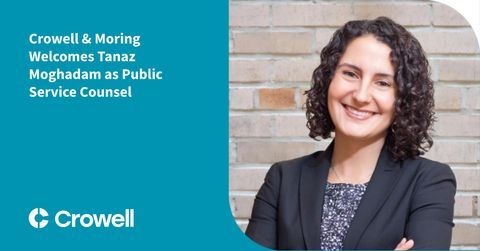Crowell & Moring Files U.S. Supreme Court Brief on Behalf of the American Bar Association Calling for Review of When the Wrongfully Convicted Can Seek Damages
Firm News | 3 min read | 01.22.20
Brief supports ABA’s promotion of measures to avoid or redress wrongful convictions
Washington – January 22, 2020: Crowell & Moring LLP filed an amicus brief on behalf of the American Bar Association in the U.S. Supreme Court in Louis Taylor v. County of Pima; City of Tucson (No. 19-756), supporting a petition for certiorari in a case concerning whether a wrongfully incarcerated person can be barred from seeking civil damages when his original convictions have been vacated, yet he has been released from prison on the condition that he plead no contest to time served. The ABA urges the high court to clarify the scope of Heck v. Humphrey, 512 U.S. 477 (1994), which held that, to recover damages under 42 U.S.C. § 1983 for an allegedly unconstitutional conviction or imprisonment, a plaintiff must show that the conviction or sentence has been reversed, expunged, or declared invalid in some way.
Taylor v. County of Pima is an appeal of a Ninth Circuit decision affirming the dismissal of Taylor’s lawsuit against Pima County, Arizona and the City of Tucson, in which he alleged that the County violated his constitutional rights in incarcerating him for 42 years, in connection with the deaths of 28 people in a tragic hotel fire in 1970 in Tucson, Arizona. Taylor, then a 16-year-old African American, spent hours helping hotel guests escape the blaze, but was arrested when someone told police that “Negro boys” had been fighting nearby when the fire started. In 1972, an all-white jury convicted Taylor of 28 counts of murder and he was sentenced to 28 life sentences.
Decades later, review of the available evidence revealed that no factual basis existed to classify the fire as arson. Taylor also discovered that exculpatory evidence had been withheld by the prosecution, and that his convictions had been marred by prosecutorial misconduct and racial bias. In 2013, the County agreed to vacate Taylor’s original convictions and release him, but only on the condition that he plead no contest to the fire-related charges and stipulate to a sentence of time served. After 42 years of imprisonment, Taylor took the plea deal, while continuing to maintain his innocence.
In affirming the district court’s dismissal of Taylor’s action, the Ninth Circuit held that a Section 1983 plaintiff may not recover damages for any period of incarceration supported by a valid conviction and sentence. Because Taylor’s 2013 conviction and sentence were valid, the Ninth Circuit reasoned, he could not recover damages under Heck. Judge Mary Schroeder dissented, objecting to the application of Heck to a former prisoner whose original convictions had been vacated, and who had only pled no contest to time served to secure his release.
On behalf of the ABA, the Crowell & Moring team argued that, consistent with the views of five Justices in Spencer v. Kemna, 523 U.S. 1 (1998) and the dissent below, the high court should grant certiorari and confirm that Heck only applies when the person seeking Section 1983 relief remains incarcerated or could have sought habeas relief while incarcerated. The brief also explained the practical importance of discouraging prosecutors’ offices from conditioning the release of persons whose convictions have been shown to be unlawful upon new pleas, in order to avoid the payment of damages for the original convictions, which runs contrary to the ABA’s prosecutorial standards, rules, and resolutions.
“It is a privilege to partner with the ABA on this important issue,” said lead counsel and Crowell & Moring partner A. Marisa Chun. “It is critical to the integrity of our justice system that pleas be free from coercion, particularly when a defendant has been incarcerated pursuant to an unsustainable conviction.” The full brief can be found here.
Crowell & Moring partner A. Marisa Chun and counsel Amanda Shafer Berman handled this matter on a pro bono basis.
Insights
Firm News | 2 min read | 01.23.26
Crowell & Moring Welcomes Tanaz Moghadam as Public Service Counsel
Washington – January 23, 2026: Crowell & Moring LLP is pleased to announce the arrival of Tanaz Moghadam as Public Service Counsel, further strengthening the firm’s nationally recognized pro bono program.
Firm News | 2 min read | 01.16.26
Crowell & Moring Represents FGV Holdings in Successful Modification of CBP Withhold Release Order
Firm News | 3 min read | 01.15.26
Crowell Continues Health Care Litigation Expansion with Addition of Joshua Robbins
Firm News | 3 min read | 01.13.26


